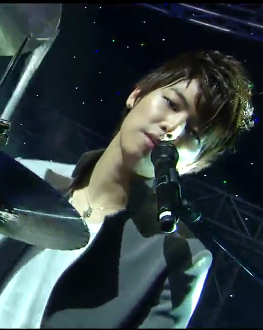 Two weeks ago, I had a revelation.
Two weeks ago, I had a revelation.
Despite not being in possession of a ticket, I decided to venture out to an outdoor concert being held on the outskirts of a small South Korean city that I’ll be calling “home” for the next three months. The draw of the concert? SNSD‘s TaeTiSeo, natch. “Twinkle” has managed to climb to #16 on my Top 25 most played songs in just a few short weeks, and sitting outside in the dust for a few hours in hopes of somehow getting let into the concert to see mah homegurl and secret BFF Tiffany seemed a pretty decent way to spend my afternoon off.
Miracle of miracles, I wound up getting into the concert — and while TaeTiSeo was utterly fabulous, I walked away from the show in firm possession not only of a limited-edition “Twinkle” SNSD fan balloon, but also of a fresh appreciation for K-rock. The reason? Maya, who opened the concert with two mind-blowingly awesome numbers that made me wonder why I’d never heard of her before.
Maya debuted in 2003 with the album Born To Do It (Vol. 1), a thirteen-track rockfest that features the song that she is perhaps still best known for, “Azalea.”
[youtube http://www.youtube.com/watch?v=FeanETYDX3Q]
Based on a poem by Kim So-weol, “Azalea” showcases Maya’s impressive vocal prowess while effectively embodying what has become her style — and it boasts a pretty impressive and profound music video to boot. Her subsequent work reflects the precedent she set for herself with Born To Do It; despite the occasional ballads and OSTs, Maya has largely stayed faithful to guitar riffs and amps, heavy bass and powerful drums. And indeed, her nine-year(!) career has seen the release of eight full-length and mini-albums, all of which are chock-full of solid rock goodness. One album, 2005’s Age of a Young Girl, is comprised entirely of remakes that put Maya’s unique spin on a number of classic Korean and non-Korean hits. Age of a Young Girl even includes Maya’s take on Lee Seung-chul’s “Girls’ Generation” — whether or not your prefer it to the original (or even to SNSD‘s 2008 version) is up to personal taste, but it’s hard to deny that Maya’s stage presence and powerful vocals create an entirely unique experience that is difficult to match or compare.
The jury has spoken: Maya is supremely talented, innovative, and an all-around BAMF. But as is often the case, very few people seem to have come to that realization, relegating Maya to a position of inferiority within the Korean music market. Though her range is impressive and her style distinct, she occupies a much lower place on the average K-pop fan’s radar than does…well, pretty much anybody who has released any sort of K-pop song in the past 24 months.
 All things considered, however, it isn’t really a surprise that Maya has fallen into a state of relative irrelevance; K-pop doesn’t reserve a great deal of space for solo singers, particularly those who teeter on the edge of the genre. Indeed, whether or not Maya’s music even constitutes K-pop is subject to debate; Maya has and likely always will be a rocker, and her style doesn’t exactly jive with a K-population fed on sugar, spice, and everything aegyo. All rough vocals and rough edges (with edgy fashion to boot), I think it’s fair to say that Maya really doesn’t exist to please anyone. She exists to make music — which is more than many others in her position within Korea’s entertainment industry can say. In fact, that her career has been so much about the music — and so much less about variety shows, dramas, endorsements, and the like — has probably contributed more to her irrelevance than has anything else, and that is a sad reality indeed.
All things considered, however, it isn’t really a surprise that Maya has fallen into a state of relative irrelevance; K-pop doesn’t reserve a great deal of space for solo singers, particularly those who teeter on the edge of the genre. Indeed, whether or not Maya’s music even constitutes K-pop is subject to debate; Maya has and likely always will be a rocker, and her style doesn’t exactly jive with a K-population fed on sugar, spice, and everything aegyo. All rough vocals and rough edges (with edgy fashion to boot), I think it’s fair to say that Maya really doesn’t exist to please anyone. She exists to make music — which is more than many others in her position within Korea’s entertainment industry can say. In fact, that her career has been so much about the music — and so much less about variety shows, dramas, endorsements, and the like — has probably contributed more to her irrelevance than has anything else, and that is a sad reality indeed.
Surprisingly, Maya has been making regular appearances on the music programs that many K-pop fans tune into weekly — and with her rather consistent music-making, it certainly seems as though it should have been easier to track her down before actually having accidentally seen her live. However, Maya seems to have fallen into the grey area that plagues those who promote in  a world of idols, but make music in a world of artists. Her uniqueness sets her apart, but it also largely barrs her from mainstream success — which reminds us all that mainstream success in K-pop seems to come at a heavy price of compromising a not insignificant amount of musical integrity for the sake of mass appeal. Which is not to say that Maya should or even needs to have mainstream success — but it would admittedly be nice to see more people enjoying the music she makes.
a world of idols, but make music in a world of artists. Her uniqueness sets her apart, but it also largely barrs her from mainstream success — which reminds us all that mainstream success in K-pop seems to come at a heavy price of compromising a not insignificant amount of musical integrity for the sake of mass appeal. Which is not to say that Maya should or even needs to have mainstream success — but it would admittedly be nice to see more people enjoying the music she makes.
It would be even nicer, however, if Maya were to win the recognition she deserves for her hard work and barrier-breaking style. There are so few strong female performers in K-pop, and almost none that branch out into the rock genre. Even fewer are those who embody a strong and powerful image while possessing the talent and ability to back it up. A more mainstream Maya would mean that girls and young women would have someone besides Hyuna or Lee Hyori to look up to as a picture of the modern, capable female musician. Exaggeration, but you catch my drift, yeah? It would also broaden the appeal of K-pop, bringing in fans who are perhaps more attuned to edgier beats and huskier voices. Dare I say that it might even raise the genre’s sophistication up just a notch?
For any K-pop fans interested in listening to some pretty decent K-rock, I encourage you to look into Maya’s impressive body of work — you’ll have your fair pick of songs to choose from. And do leave a comment if you find one that you adore!
Any Maya fans out there in Seoulbeatsland?
(Nate, Moto Musiq)


